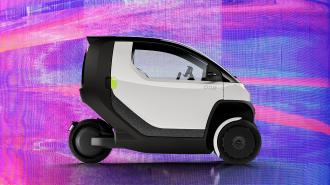Michigan-based manufacturer Nimbus has opened pre-orders for their compact electric vehicle, the Nimbus One.
The EV, shaped something like the head of a golf club, aims to combine the agility, convenience, and lower price of a scooter or motorcycle with more of the safety and security people find in a car. Its US “auto-cycle” classification is “the best of both worlds,” Nimbus founder Lihang Nong told TechCrunch.
Operating on three wheels, the Nimbus One is small enough to slip easily into parking spaces, including those made for motorcycles, and tilts like a scooter or bike.
“Scooters are fun, but they’re also kind of dangerous, but they lean, so that’s fun,” Nong told TechCrunch.
“Our vehicle does the same thing, but it takes the skill out of it. So my mom can get in and start to drive. Have you ever driven a boat? It drives kind of like a boat. You turn left and it pitches to the left.”
The compact electric vehicle aims to combine the agility, convenience, and lower price of a scooter or motorcycle with the safety and security people find in a car.
The Nimbus One’s closed chassis will have seating for two, front airbags, anti-lock brakes, and traction control, the company details.
Because it is designed for urban transport, it tops at 50 mph, with a predicted range of 93 miles in the city — city mileage is, as a general rule, less than highway — on a 9 kilowatt per hour battery, which the company says can charge to 95% in a little under five and a half hours, using home electricity.
Nimbus’ compact electric vehicle will also have a frontal collision warning system, and the company says it will be able to send updates and new features remotely to customers.
As could perhaps be expected, this prototype’s offerings are a bit different than when New Atlas covered the Nimbus One in March 2021 — the removal of the curtain airbags perhaps the most notable difference between the proposed specs and the newest ones.
Pre-orders for the Nimbus One have begun with the company asking for $100 down payments, TechCrunch reported, and a sticker price of $9,980; they also intend to offer the vehicles as a subscription service.
There’s some caveats though, if you’re already picturing whipping your little guy around the street — they have yet to choose which launch city will receive their orders first, and fulfillment won’t begin, the company expects, until the third quarter of 2023.
Perhaps the biggest potential snag, though? Money. As TechCrunch pointed out, rising manufacturing costs mean they will need to raise millions in order to start getting them off the line.
We’d love to hear from you! If you have a comment about this article or if you have a tip for a future Freethink story, please email us at tips@freethink.com.
